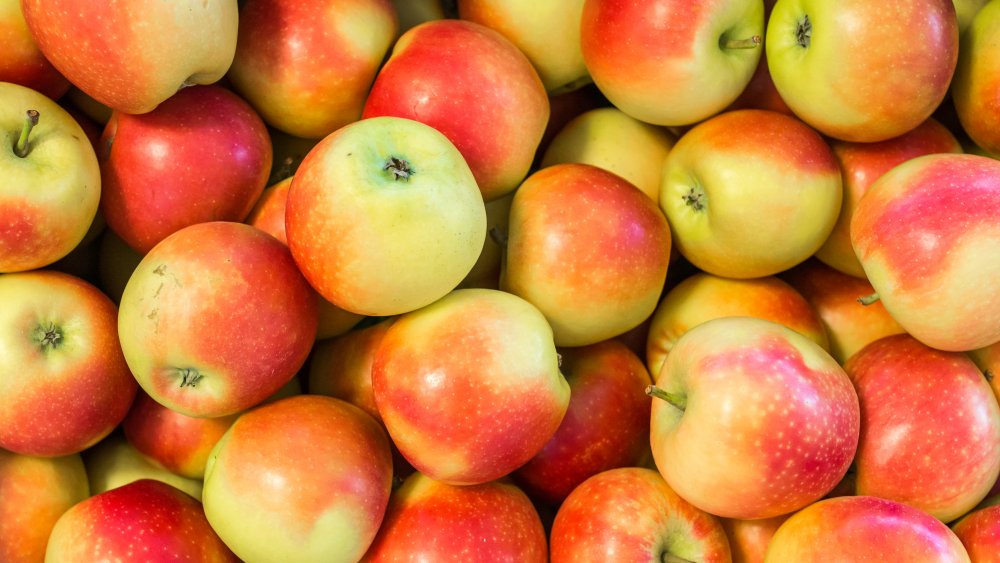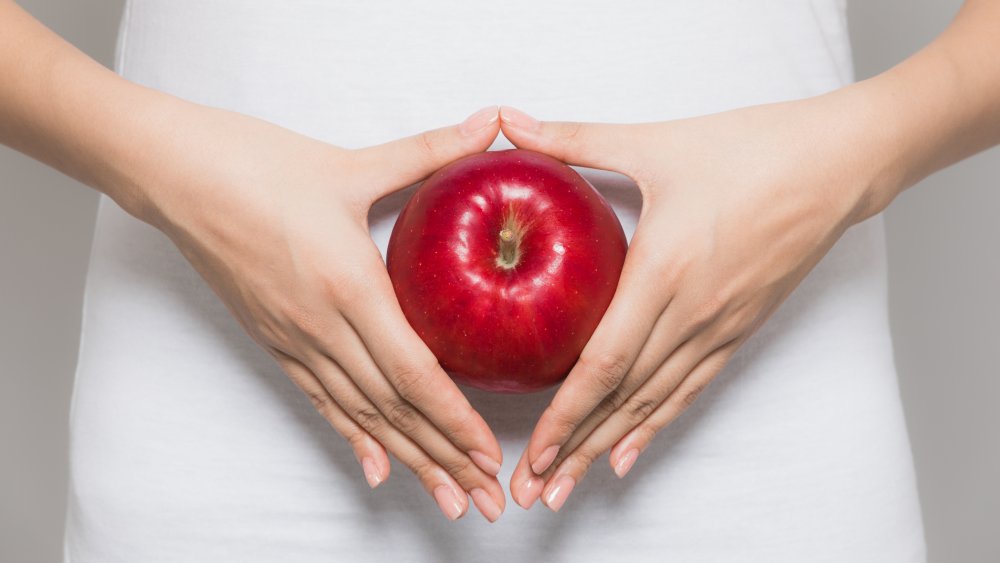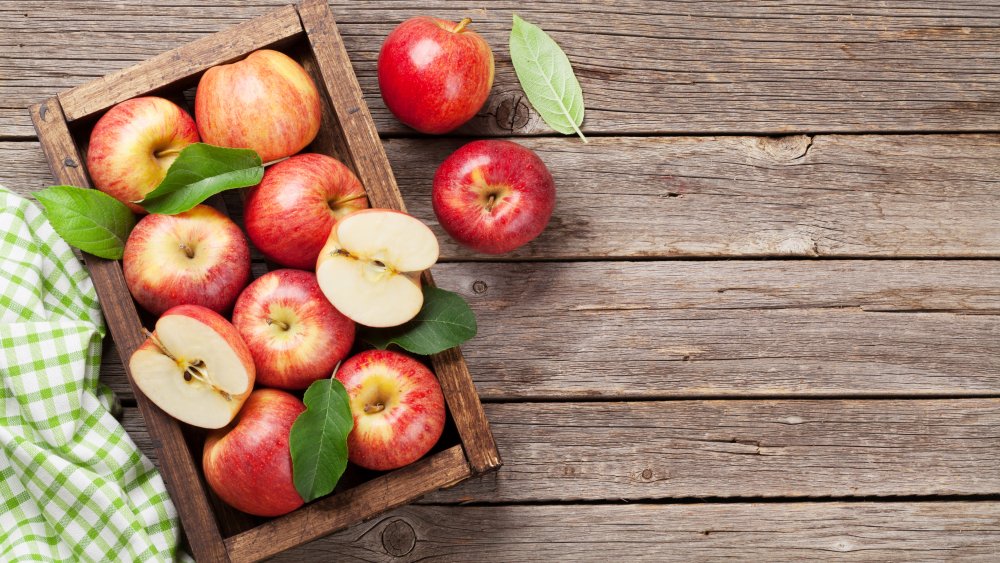Here's What Actually Happens When You Eat An Apple Every Day
Apples are one of America's favorite fruits, and it's not hard to see why. Red or green, apples are nutritional powerhouses (and they're even better if you choose organic). According to the Harvard School of Public Health, eating apples has been proven to help with everything from weight loss to heart health. Since they're easy to toss in your bag and eat on-the-go, apples have earned their place as one of the most convenient healthy snacks.
The average American eats nearly 17 pounds of apples per year (via Statista), and sliced apples are even served at fast food restaurants like McDonald's. But what happens to your health when you eat an apple every day? Does an apple's sweetness hide a poisonous secret? (Spoiler: Nope, eating an apple a day is good for you.)
Apples boost your head-to-toe health
Apples and oranges might be different, but they're both great sources of vitamin C. Per Self's Nutrition Data, a medium apple provides 14 percent of the recommended daily use of vitamin C, as well as six percent of your recommended potassium. Apples are jam-packed with flavonoids, naturally occurring chemicals with antioxidant and anti-inflammatory effects (via the Harvard School of Public Health.) And because apples are 85 percent water, they're hydrating as well as filling, according to Nola.com.
Apples are also a great source of fiber, with 4.4 grams of fiber in every medium-sized fruit. According to the Mayo Clinic, high fiber diets do more than regulate your digestive system; they can also lower cholesterol, help control blood sugar levels, and reduce the risk of cardiovascular disease and cancers. Plus, roughly 20 percent of an apple's fruit consists of pectin, which has been linked to lower cholesterol (via Healthline.) That makes a daily apple a sweet part of a high fiber nutrition plan.
Apples help with good gut bacteria
Eating apples is great for your gut health. Per Washington State University, a study showed that the non-digestible compounds in apples contribute to the growth of healthy bacteria. Having healthy gut bacteria helps ward off viruses and other harmful bacteria (via University of California, Davis Health.) Adding apples to your diet can have a major effect on your overall gut health, too. According to food scientist Giuliana Noratto, "Obese people have an out-of-balance gut. So changing our gut bacteria via what we eat, making it similar to that of a lean person, could help prevent weight gain." (via Fox News)
While there are hundreds of apple varieties, one kind of apple provides the most gut health benefits: the humble Granny Smith. Granny Smiths outperformed Fuji, Gala, McIntosh, and other popular varieties when it came to the concentration of fiber and low level of carbohydrates. That doesn't mean you have to bump red apples off the table. Nutritionist Fiona Tuck told the Huffington Post that while green apples slightly outperform with fiber, red apples have slightly more antioxidants. Bottom line: Any color of apple will be beneficial for your health.
You can actually eat more than one apple a day
When it comes to apples, it's hard to get too much of a good thing. Nutritionist Leslie Beck told The Globe and Mail that eating an apple a day is perfectly safe and won't add too much sugar to your diet. Beck suggests aiming to consume two to three servings of fruit every day. That means, while eating one apple a day has plenty of benefits, it's safe to eat even more. The United Kingdom National Health Service reported that eating two apples per day can help cut cholesterol levels by four percent.
Craving a third apple? One study in the journal Nutrition showed that eating three apples (or pears) per day helped overweight women lose weight. While it might be safe to eat even more apples, there are some downsides. LiveStrong notes that eating too much fiber can cause bloating, and despite their low calorie count, too many apples can help you pack on the pounds. Still, an apple or two a day has more benefits than drawbacks. And while it won't necessarily keep the doctor away, eating an apple a day might keep another medical professional at bay: the pharmacist. According to a JAMA study, daily apple eaters tend to take fewer prescription medicines.
Apple juice doesn't provide the same benefits
Sweet, tart apple juice tastes delicious, whether it's added to a green juice or sipped by itself. Unfortunately, apple juice strips away most of the nutritional benefits of just eating an apple. According to Healthline, apple juice is high in sugar and low in fiber. Not only does that mean missing out on fiber's benefits for your digestive system, it means apple juice will leave you feeling hungry sooner than if you ate an apple instead. When you do drink apple juice, try to pair it with a protein. One study showed that eating peanut butter alongside a breakfast with apple juice reduces the magnitude of blood sugar spikes.
To get maximum health benefits from an apple, put your peeler away! Apple skin is responsible for most of the fiber and nutrients in apples, according to the Harvard School of Public Health. Peeling an apple more than halves the amount of fiber in the fruit (via Huffington Post.) If you're really hardcore, an apple's core will provide additional nutritional benefits. According to Today, apple cores contain more healthy bacteria than just the apple flesh. But however you eat an apple, your body will be glad you did.




